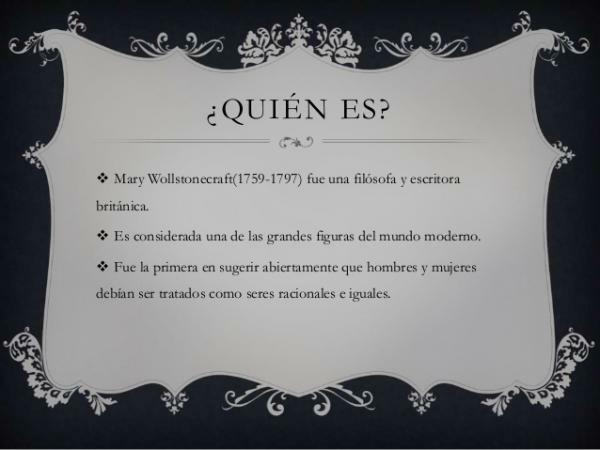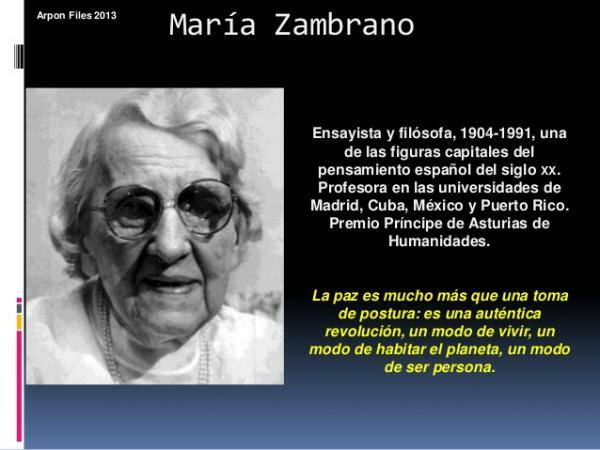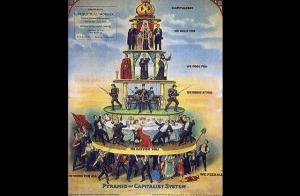Most important feminist philosophers

Image: Women in History
We will dedicate this lesson from a TEACHER to the most important feminist philosophers of history, all of them, women who have fought and they fight against machismo and inequalities. They start from the basis that these injustices are the product of human efforts to perpetuate them. Gender inequalities are cultural in origin, they have been created by society, and it is in their hands to end them. Thus, feminist philosophers have set their sights on these injustices and have pointed them out, and have spoken for themselves and for so many other women who suffer in silence. If you want to know more about the most important feminists of all time, keep reading this lesson.
Index
- Hyparquía of Maronea (S. IV BC), the first feminist philosopher
- Mary Wollstonecraft (1759-1797)
- Simone de Beauvoir (1908-1986)
- Maria Zambrano (1904-1991)
- Angela Davis (1944)
- Catia Faria, another of the essential feminist philosophers
Hyparquía of Maronea (S. IV BC), the first feminist philosopher.
We begin this lesson on the most important feminist philosophers to talk about Hyparquía de Maronea. She was the first feminist in history, "a bitch", the only woman belonging to the cynical school (the sect of the dog), a disciple of Diogenes of Sinope and couple of Crates, who made it a condition to imitate her habits, and thus, she dressed in rags.Diogenes Laertius she dedicates a chapter to him in her book Life and work of illustrious philosophers, and she is the only woman who appears in it.
This philosopher questioned the roles assigned based on gender and she was critical of patriarchy. She condemned the traditional culture of Athens that excluded women from public life and relegated it to the private sphere, to the domestic economy.
Athenian society, patriarchal, macho and misogynist, she was the center of the Hyparquia attacks, who actively participated in philosophy and politics. She was a contested and libertine woman, who renounced all her wealth for being faithful to her ideals, and who was always ready to help those most in need.
Hyparquía wrote three books, but none are preserved: Philosophical hypotheses, Epiqueremes Y Questions to Theodore called the Atheist.
In this other lesson we will talk about him feminism in philosophy.

Image: Slideshare
Mary Wollstonecraft (1759-1797)
English philosopher and writer and author of the work Vindication of women's rights, a classic of feminism that deals with the issue of inequality between the two sexes. The foundation of morality, she says, is reason, which is the same in both cases. She defends the autonomy and independence of women in the eighteenth century, when women were nothing more than a mere object of man's desire, an entertainment.
Wollstonecraft is committed to a type of marriage in which both parties share intellectual interests, and this is only achieved if there is an education under equal conditions for women and men. This great thinker, she died young, only she was 38 years old, but her influence on the history of philosophy is clear, and she has laid the foundations of feminist thought.
“I do not want women to have more power than men, but rather to have more power over themselves”.

Image: Slideshare
Simone de Beauvoir (1908-1986)
Simone de Beauvoir is another of the most important feminist philosophers. Existentialist philosopher and author of a fundamental work in the history of philosophy, The second sex, that has fed all feminist thought since the mid-twentieth century, being considered the bible of feminism. In this sense, the female slavery, by J. S. Mill, the only philosopher who cares about the situation of women in the entire history of universal thought.
Without this book, it is impossible to understand feminism, which for Beauvoir it is, individually, a way of life, and collectively, a struggle
Because Faucault, Freud, Chomsky, Shopenhauer, neither Marx, neither NietzscheThey have never written philosophy for women, dealing with machismo or injustices due to sex issues, which are given and favored within society.
“The day that a woman can not love with her weakness, but with her strength, not to escape from herself, but to find herself, that day love will be for her the source of life and not a mortal danger”.
Maria Zambrano (1904-1991)
Although this cat (María adored and lived with cats) did not consider herself a feminist, the truth is that the Malaga woman actively participated in the fight against inequalities between women and men, defending the inclusion of women in public life, and not limited to private life, within the domestic sphere. Politics, he says, have an obligation to demonstrate to change an unjust situation.
“The new woman does not deny or resent the man, because she does not feel enslaved by him (...) the a turn of the woman in her demands that the off-center and maladjusted man does not know - generally - or does not want fill them. But at least they don't kill us!”.

Angela Davis (1944)
Philosopher and feminist activist, author of the book, Women race and class, among others, and a disciple of Herbert Marcuse, belonging to the Frankfurt school, from which she, in her own words, she learned that philosophers and philosophers have the obligation to change the world, that is his responsibility, and that is why they have to make the leap from theory to practice, move on to action.
Angela Davis, has spent her entire life collaborating with different movements that fight against discrimination and social injustice, expanding the concept of feminism:
“Feminism is a strategy not only to overcome gender oppression, but also racism, fascism and economic exploitation”.
The philosopher affirms that gender violence does not occur because men are bad, but is a consequence of the violence throughout history. This unfair situation has been perpetuated in such a way that they cannot change. This is why women have stood up, to finally change them.
The institutions are the violent ones, and not the people individually, since it is not up to them to decide. And this violence is directed towards women, towards people who are not white, towards homosexuals, towards men and women. poor, sick people, that is, towards everything other than the white male human being, heterosexual, middle class and healthy.
“Feminism will be anti-racist or it won't be”.

Catia Faria, another of the essential feminist philosophers.
Catia Faria is another of the most important feminist philosophers. She is a Portuguese philosopher and activist and author of the first doctoral thesis worldwide, which addresses the question of human intervention in nature and offers the reasons why, the human being, should help them.
“The struggle for equality and justice it will necessarily be feminist and antispeciesist”.
“Discrimination and oppression are unjustified, whether they affect humans or non-humans”.
Being a feminist and speciesist has, for this philosopher, no justification, since machismo and speciesism, like the racism, They are based on the idea that there are superior human beings because of race or sex, or because they are not human. It does not matter if it is a human or non-human animal, the only thing that matters is how they can feel, if they can suffer, if they have an interest in life. And this is something that both humans and non-humans share. The sentience it is the only relevant thing.
“Feminist concern for equality must necessarily include nonhumans”.
Other important feminist philosophers are Harriet Taylor Mill, Martha Nussbaum, Graciela Hierro Pérez-Castro, Judith Butler, Celia Amorós, Amelia Valcárcel, Alicia Puleo, Paula Casal, etc.

If you want to read more articles similar to Most important feminist philosophers, we recommend that you enter our category of Philosophy.
Bibliography
Juan Sinisio Pérez Garzón. 2011. Foreword by Amelia Valcárcel. History of Feminism. Cataract Ed



